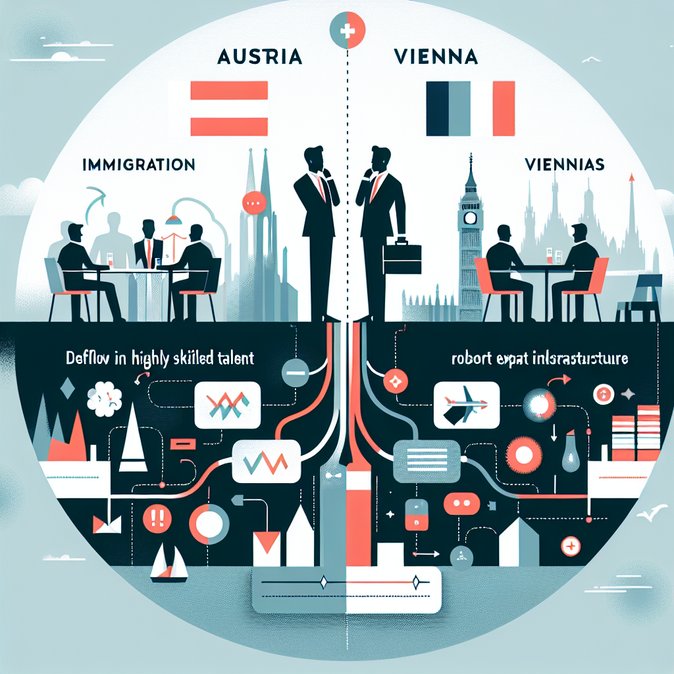
Fresh figures released late on 28 October 2025 by the Austrian Integration Fund (ÖIF) underscore how rapidly the country’s demographic landscape is changing. According to the ÖIF’s annual “Bundesländer” brochure, 22.7 % of Austria’s total population—around 2.085 million people—were born abroad as of 1 January 2025, up from 22.3 % a year earlier. Nowhere is the trend more pronounced than in the capital: foreign-born residents account for 40.9 % of Vienna’s 2 million inhabitants, making it one of the most internationally composed cities in the EU.
Germany heads the list of countries of origin (≈270,500 residents), followed by Bosnia-Herzegovina, Turkey and Romania. Yet the data reveal a paradox. While overall immigration is rising, Austria’s flagship talent-attraction tools—such as the points-based Red-White-Red Card and the EU Blue Card—are not scaling fast enough to meet labour-market needs. Only 12,400 foreign specialists currently hold Red-White-Red Cards, a tiny fraction of Austria’s four-million-strong workforce. In the OECD’s 2024 “Talent Attractiveness” index, Austria slipped to 25th place, eight rungs lower than 2019.
Business federations and consultancies cite three main obstacles: comparatively high payroll taxes, complex provincial bureaucracy (especially at Vienna’s immigration office MA35) and what some executives call a lukewarm “welcome culture.” Portuguese-Austrian chemist Nuno Maulide has publicly criticised the protracted visa-renewal process for laboratory staff. Deloitte Austria partner Elisa Aichinger warns that firms must benchmark their talent offers against global tech hubs, not just regional peers.
Opposition parties seized on the statistics to demand stricter limits on asylum and tighter access to social benefits. Vienna city officials countered that diversity is essential to fill staffing gaps in healthcare, construction and hospitality, and pointed to record enrolment in German-language integration courses. The debate is set to intensify as parliament examines amendments to the Red-White-Red Card law aimed at easing salary thresholds and recognising more foreign qualifications from January 2026.
For global-mobility teams, the numbers carry two practical messages. First, Vienna’s sizeable expatriate ecosystem offers a deep bench of language schools, relocation providers and international schooling options. Second, lead times for residence-permit appointments remain lengthy; companies planning 2026 transfers should budget at least three months from offer letter to start date, despite MA35’s recent move to allow bookings at any branch office city-wide.
If policymakers can streamline procedures and market Austria more assertively to high-skilled migrants, the latest demographic surge could become a strategic asset rather than a political flashpoint.
Germany heads the list of countries of origin (≈270,500 residents), followed by Bosnia-Herzegovina, Turkey and Romania. Yet the data reveal a paradox. While overall immigration is rising, Austria’s flagship talent-attraction tools—such as the points-based Red-White-Red Card and the EU Blue Card—are not scaling fast enough to meet labour-market needs. Only 12,400 foreign specialists currently hold Red-White-Red Cards, a tiny fraction of Austria’s four-million-strong workforce. In the OECD’s 2024 “Talent Attractiveness” index, Austria slipped to 25th place, eight rungs lower than 2019.
Business federations and consultancies cite three main obstacles: comparatively high payroll taxes, complex provincial bureaucracy (especially at Vienna’s immigration office MA35) and what some executives call a lukewarm “welcome culture.” Portuguese-Austrian chemist Nuno Maulide has publicly criticised the protracted visa-renewal process for laboratory staff. Deloitte Austria partner Elisa Aichinger warns that firms must benchmark their talent offers against global tech hubs, not just regional peers.
Opposition parties seized on the statistics to demand stricter limits on asylum and tighter access to social benefits. Vienna city officials countered that diversity is essential to fill staffing gaps in healthcare, construction and hospitality, and pointed to record enrolment in German-language integration courses. The debate is set to intensify as parliament examines amendments to the Red-White-Red Card law aimed at easing salary thresholds and recognising more foreign qualifications from January 2026.
For global-mobility teams, the numbers carry two practical messages. First, Vienna’s sizeable expatriate ecosystem offers a deep bench of language schools, relocation providers and international schooling options. Second, lead times for residence-permit appointments remain lengthy; companies planning 2026 transfers should budget at least three months from offer letter to start date, despite MA35’s recent move to allow bookings at any branch office city-wide.
If policymakers can streamline procedures and market Austria more assertively to high-skilled migrants, the latest demographic surge could become a strategic asset rather than a political flashpoint.








